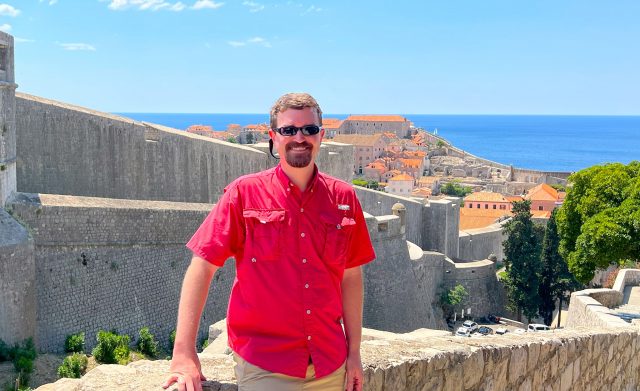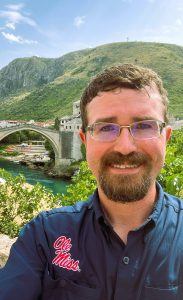
Matthew Becker, research associate for outcomes assessment and learning advancement at the School of Pharmacy, visits Dubrovnik, Croatia, in 2022. Becker recently attended a workshop at Arizona State University to share his expertise on the Balkans region. Submitted photo
OXFORD, Miss. – A University of Mississippi research associate was selected to attend a workshop that brought together experts interested in engaging the public with their knowledge of Russia, Eurasia and Eastern Europe.
Matthew Becker, research associate for outcomes assessment and learning advancement at the School of Pharmacy, joined 14 academics from a variety of fields in August in Tempe, Arizona. Hosted by the Melikian Center for Russian, Eurasian and East European Studies at Arizona State University, the “Multimedia Methods in Public Scholarship” workshop explored leading strategies for sharing the participants’ regional expertise publicly.
“I’ve done a lot of academic research on this region, so I was very interested in applying for this opportunity,” Becker said. “The workshop helped me acquire a tool kit to translate academic knowledge into different genres of writing, speaking and publishing to engage both a public and policy audience.”
The idea of “taking academic knowledge public” is not new to Becker. He has written op-eds on incrementalism and the “One China” policy, and he credits the workshop for helping strengthen his writing skills for future projects.
“Policymakers and the broader public alike are therefore able to better understand and respond to the challenges arising out of past, present and future grievances as well as antagonisms, conflicts and rhetoric within Russia, Eurasia and Eastern Europe,” he said.
Three projects emerged from his participation in the event, Becker said. The first examines the Chinese “Belt and Road Initiative” in the Western Balkans. The BRI seeks to develop infrastructure projects, such as railways, roads and ports, to connect China to other countries around the world, in effect, a “New Silk Road.”
“This is basically asking the question of what does China want in the Western Balkans,” he said. “In terms of infrastructure investments with BRI, there are always strings attached. With the BRI, it’s a ‘debt trap’ that China uses to gain influence. The economic aspect also relates to soft power and a positive media image.
“This Chinese soft power, in comparison to Chinese hard power, is an attempt to create a positive perception of Beijing in the region.”
The second focuses on Serb nationalism and potential for conflict in Kosovo, and the third looks at the “frozen conflicts” in Moldova and Georgia and their significance for international security and American policy. Becker has firsthand knowledge and experience in this area, as he has visited one of the frozen conflicts as well as Kosovo and Serbia.
While pursuing his doctorate in political science at Ole Miss, Becker studied in the Balkans. He was the recipient of a Boren Fellowship in 2012 that allowed him to travel to Bosnia and Herzegovina to conduct research for his dissertation.
As part of his fellowship, he also studied Bosnian, Croatian and Serbian at Arizona State’s Critical Languages Institute, housed within the Melikian Center.
“We were so glad that Matt Becker, who studied at ASU’s Critical Languages as a graduate student, renewed his engagement at the Melikian Center,” said Keith Brown, the center’s director. “He has already been sharing his regional and geopolitical expertise with wider publics and was able to share his experience with other early career scholars as well as map out a strategy to explain how tangled great power rivalries impact Serbia and the Western Balkans.
“Matt’s contributions served as reminder of the long-term value of close, in-depth study to inform policy conversations.”
Becker’s participation in the workshop was funded by the U.S. Russia Foundation. According to its website, the foundation is “a legacy organization of the U.S. Russia Investment Fund, founded by the U.S. government under the Support for Eastern European Democracy Act of 1989 and the Freedom Support Act of 1992.”
